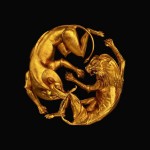This post was updated July 21 at 10:07 p.m.
The circle of life continues with Beyoncé’s new album, “The Lion King: The Gift.”
“The Lion King” was first released in 1994. Twenty-five years later, the Disney classic is receiving new life with this week’s release of the live-action iteration of the film. And, fittingly, Beyoncé – who voices Nala in the film – released a new album paying tribute to both the film and the cultures of Africa. In the context of Beyoncé’s past pop and R&B albums, this new release is a welcome change from her previous radio hits, as many of her tracks feature relatively unknown Nigerian artists. Boasting 27 tracks, some might consider the album to be a bit too lengthy, but the breadth of songs is necessary to create a beautiful lyrical translation of the film’s well-known story.
[RELATED: ‘No.6 Collaborations Project’ shows off Ed Sheeran’s skills spanning genres]
The first track, “balance (mufasa interlude),” sets the foundation for her lyrical storytelling. The song opens with lines from Mufasa, played by James Earl Jones, taken directly from the film and set to a soft yet dramatic violin. Similar interludes comprise nearly half of the album, each featuring the voice actors from the film. The track list alternates between interludes and Beyoncé’s original tracks, featuring different artists, providing a coherent, unified record.
Listeners are treated to the work of Kendrick Lamar, Jay-Z and Pharrell Williams in the album while a host of African artists, such as Tekno and Yemi Alade, can be found in “DON’T JEALOUS ME.” This track, like many others throughout the release, blends Kiswahili, a common African language, with the English language in the style of American rap and hip-hop.
The collaboration creates a synthesis of sounds that has been largely unheard of in the American music industry. This is certainly surprising coming from Disney, a company known to cater toward children, since this album could set new trends and leave lasting impacts when it comes to the blending of languages in the rap and hip-hop genres.
On top of showcasing African voices, tempos and lyrics, the track list moves logically, allowing the listener to picture exactly where the song might be featured in the live adaptation it follows.
Looking at Beyoncé’s original tracks specifically, “BIGGER” and “FIND YOUR WAY BACK” are clearly sung with the baby Simba character in mind, with lyrics referencing his journey to discover that he is “part of something way bigger.” “FIND YOUR WAY BACK” is especially soft and hopeful, with lyrics that draw on the imagery of a father raising his son. However, at the record’s halfway point, “NILE” uses a tense and suspenseful beat in conjunction with rap to showcase Simba’s terror and confusion as he runs away from Pride Rock, singing, “I don’t tend to youth, I said I’m drowning in it.”
Instrumentals that flow alongside the tracks’ lyrics also aid in the album’s overall form of storytelling. Songs closer to the beginning of the track list – “the stars (mufasa interlude)” and “FIND YOUR WAY BACK” – are paired with an upbeat drum or a peaceful piano or guitar. Meanwhile, “run away (scar & young simba interlude)” and “MY POWER” are fittingly paired with an absence of instrumentals and feature artists rapping the lyrics to represent Simba’s struggles. This likens Beyoncé’s album to that of a film soundtrack, but it cannot be entirely labeled as such, as each song is a lyrical track that stands alone as its own potential hit, some even transcending genre.
[RELATED: Mac DeMarco refuses to be kept in a box in his latest ‘Here Comes The Cowboy’]
Aside from storytelling, it’s obvious who the scene stealer is on this album: Blue Ivy Carter. Her debut as a singer fits perfectly – her voice opens the track “BROWN SKIN GIRL,” which speaks directly to black youth. While the track briefly steps away from the story of “The Lion King,” it is conceivably the best song on the album, as it reminds each listener to take pride in their own skin color and history. The track transforms into a beautiful ballad between mother and daughter with Beyoncé reminding Blue Ivy and black girls everywhere to “remember what mama told me,” to which Blue Ivy sings “Brown skin girls, your skin just like pearls, the best thing in all the world.”
Unlike usual radio hits, which contain lyrics or messages that might be fleeting, no one will soon forget the story of resiliency told through a track like “SPIRIT.” This makes the song a flawless closer to an album already filled with soul. It is a nod to African stories, storytelling and vocals as black background singers are heard harmonizing in an almost gospel manner. By the end of the song, Beyoncé’s lyrics hint that “destiny is comin’ close” with the release of “The Lion King” on the horizon this weekend.
Beyoncé has truly accomplished something singularly unheard of before with her newest release. It cannot be clearly defined as an original soundtrack, yet it emulates musical storytelling from every track, setting itself apart from similar endeavors that are merely inspired by a film. It acts as the perfect reminder for what the new film, soundtrack and accompanying projects can be about: the celebration of cultures and skin colors long overlooked.
And that’s a true gift in this great circle of life.
